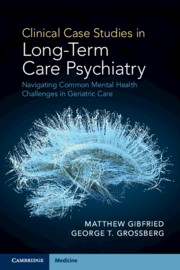 Clinical Case Studies in Long-Term Care Psychiatry
Clinical Case Studies in Long-Term Care Psychiatry ADD in Older Adults
Published online by Cambridge University Press: 31 October 2024
Symptoms of adult ADHD can mimic early major neurocognitive disorders in older adults. Deficits uncovered in standard cognitive tests can be due to impaired attention in those older adults with ADHD. Treatment of adult ADHD in older adults is similar to that in younger patients and includes stimulant and non-stimulant medications. Extra caution should be used when prescribing stimulant medications to those with medical or psychiatric comorbidities. About 60% of children or adolescents with ADHD go on to experience adult ADHD. Symptoms of adult ADHD may lessen or be less problematic in older adults. Some older adults may still benefit from treatment.
To save this book to your Kindle, first ensure no-reply@cambridge.org is added to your Approved Personal Document E-mail List under your Personal Document Settings on the Manage Your Content and Devices page of your Amazon account. Then enter the ‘name’ part of your Kindle email address below. Find out more about saving to your Kindle.
Note you can select to save to either the @free.kindle.com or @kindle.com variations. ‘@free.kindle.com’ emails are free but can only be saved to your device when it is connected to wi-fi. ‘@kindle.com’ emails can be delivered even when you are not connected to wi-fi, but note that service fees apply.
Find out more about the Kindle Personal Document Service.
To save content items to your account, please confirm that you agree to abide by our usage policies. If this is the first time you use this feature, you will be asked to authorise Cambridge Core to connect with your account. Find out more about saving content to Dropbox.
To save content items to your account, please confirm that you agree to abide by our usage policies. If this is the first time you use this feature, you will be asked to authorise Cambridge Core to connect with your account. Find out more about saving content to Google Drive.